Can ferrets get along with dogs? Do ferrets and dogs have a good relationship together in the same house? Do they play well together? Do they fight all the time? The answer to these questions is not as simple as it may seem.
There are many factors that come into consideration, such as how old both animals are, their size, temperament, and more. In this article, we will discuss those factors so you can make an informed decision on whether or not your dog would be a suitable companion for your pet fur ball!
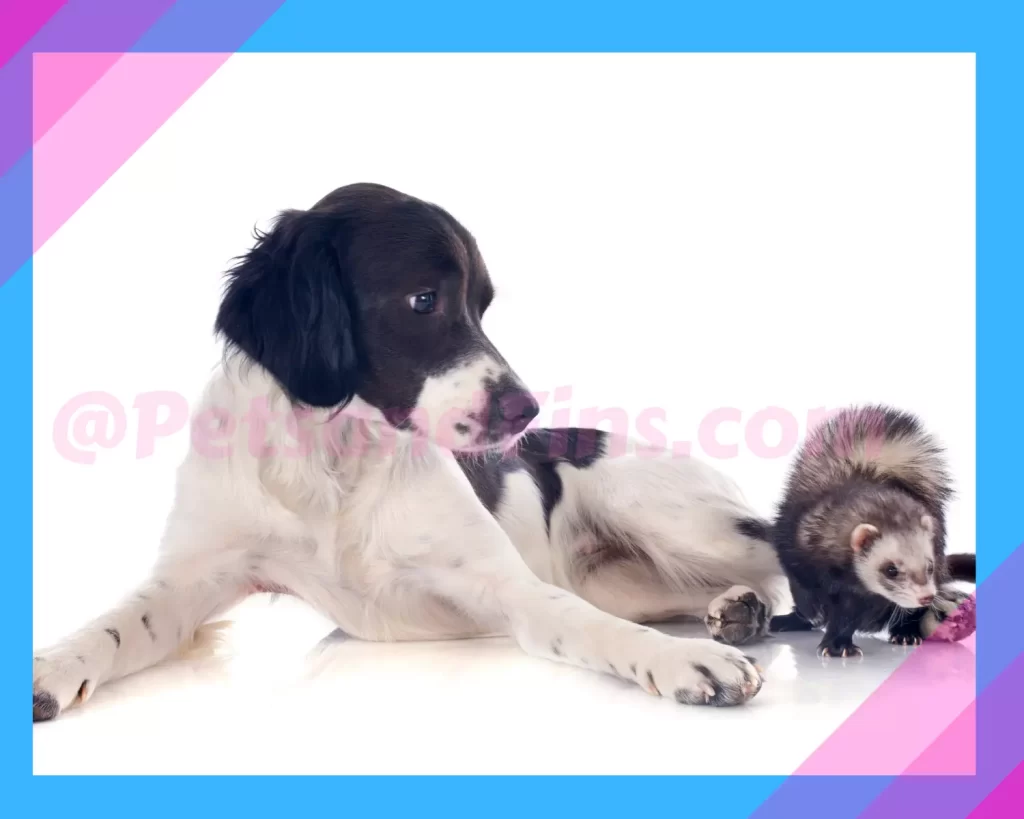
Whether your dog and ferret will get along depends on many factors, including how long you’ve had your dog, if they’re raised together, the temperament of both animals, whether or not they have been neutered or spayed (if applicable), and what type of breed your dog is. So let’s take a closer look at each factor so you’ll have an easier time deciding if it’s safe for them to live in harmony!
Do Ferrets And Dogs Get Along ?
The first question that comes to mind for many people is whether or not ferrets and dogs get along. The answer, like so many things in life, is, IT DEPENDS!
If you’ve had your dog since he was a puppy and they’ve been raised together, then the chances are good that they will get along just fine. However, if you are considering adopting a ferret and already have a dog (or vice versa), it’s important to take into account both animals’ personalities before making a decision.

Dogs can be protective of their territory and may see the ferret as a threat. However, with proper introduction and supervision, most dogs will eventually get along well with ferrets. Ferrets, on the other hand, love to play and chase things, so they may try to take advantage of any dog who isn’t paying attention. With patience and supervision, though, both species can live happily together.
Dogs and ferrets can make great companions for each other. They have a lot of similarities, including their high energy levels and love of playtime. But there are also some key differences between the two species that you should be aware of before deciding to introduce a ferret into your home with dogs present.

Factors To Consider For Dog-Owning Families:
Many people believe that since ferrets and dogs are both predators, they will automatically get along. This isn’t always the case! Ferrets are much smaller than dogs and can be seen as prey by some dogs. Dogs that have not been properly socialized or trained may see a ferret as a toy to play with, which could lead to injuries for the little guy.
Dog Temperment:
The temperament of your dog is an important factor to consider when deciding if a ferret is the right pet for your home. Some dogs are simply too rough and may unintentionally hurt a ferret, even if they’re not trying to. On the other hand, some dogs are very docile and will be more than happy to have a little friend running around.
If you have any concerns about your dog’s temperament, it’s always best to consult with a professional trainer before introducing a ferret into the home.
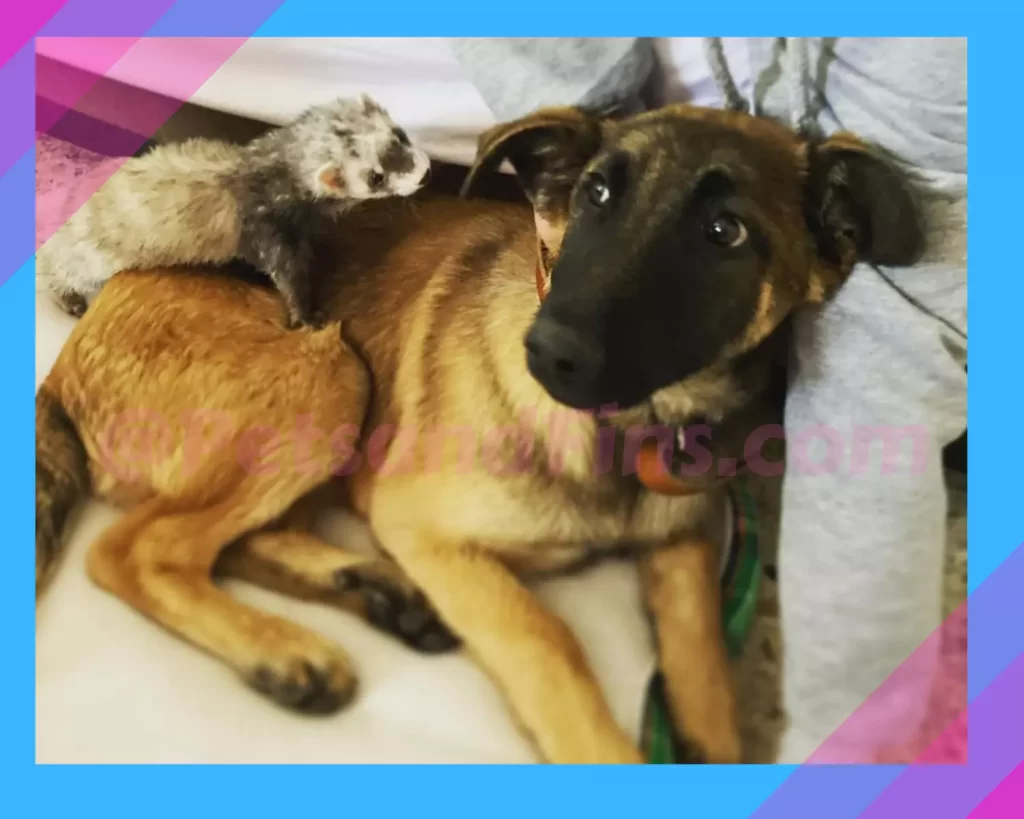
It’s also important to remember that not all dogs are good with other animals, even if they’ve been raised around them. If you’re unsure of how your dog will react to having a ferret in the house, it may be best to keep them separate until you can properly gauge their behavior.
Remember, just like humans, each animal has its own unique personality, and some dogs simply don’t get along with others, regardless of what species they are!
Spaying/Neutering The Dogs:
In addition to the temperament of your dog, you also need to take into account whether or not they have been spayed or neutered. This is important because unaltered dogs are more likely to be aggressive towards other animals, including ferrets!
One of the best ways to ensure that your dog and ferret get along is to have them both spayed or neutered. This will help to decrease any aggressive tendencies they may have and can help reduce the chances of fights breaking out.
If you have an unaltered dog and are considering getting a ferret, it’s important that you get them both fixed as soon as possible. Not only will this help reduce aggression in your pet dog, but it will also help keep the population of unwanted animals down. It’s a win-win for everyone involved!
It’s also a good idea to keep your dogs’ vaccinations up-to-date, as unvaccinated animals are more prone to getting sick if they’re exposed to other animals.
Breed Of Dog:
Aside from being altered, the breed of your dog can also have an impact on whether or not they get along with a ferret. For example, many herding dogs, such as Collies and Shepherds, are known to be very intelligent, – but may want to herd a passing ferret by nipping at their heels! On the other hand, some breeds that were specifically bred for hunting purposes (such as terriers) will likely chase after any small animal that runs away from them.
In general, though, most breeds of larger dogs tend to coexist well with both cats and ferrets regardless of their personality traits. However, if you’re planning on getting another pet in addition to a ferret and a dog, it’s important that you take your dog’s breed into account.
If you’re thinking of adopting a ferret and already have a big dog, it might be best to adopt another small animal that won’t get underfoot or try to take over your dog’s space.

Factors To Consider For Households That Already Have A Ferret :
If you already have a ferret in your home, it’s important to take into account a few things before adding a dog.
Temperment Of Your Ferret:
Just like with dogs, the temperament of your ferret is an important factor to consider when deciding if a dog is the right pet for them. Some ferrets may be intimidated by large dogs and may try to avoid them at all costs. On the other hand, some ferrets will see a new dog as a fun playmate and will want to constantly explore everything they can get their little paws on.
Ferrets are very friendly animals that love to socialize with humans and other animals alike. However, not all ferrets get along well with dogs, even if they’ve been raised around them their entire life!

There are a number of reasons why your little guy might be afraid of the family dog or cats, but it’s important to remember that this is completely normal behavior. It doesn’t necessarily mean there’s any malice between the two pets; it simply means your ferret isn’t comfortable being around another animal yet!
If you already have a ferret in your home and are thinking of getting another pet, it’s important to make sure they can get along.
Pro Tip:If you’re planning on adopting or rescuing an older dog, – try taking them to visit the shelter with your current ferret! This is a great way for both pets to see how well they’ll do together before making any final decisions about including either one into your household.
Spaying/Neutering Your Ferret:
In most cases, you should have your ferret spayed or neutered before adding a dog, – if for no other reason than to reduce their chances of fighting. Spaying and neutering not only ensures that they won’t breed with each other (or any outside animals), but it also helps to decrease aggressive behaviors between pets.
It’s also important to make sure your current ferret’s vaccinations are up-to-date before introducing them to another animal; especially if they haven’t been previously vaccinated.
Time Factor:
Consider how much time you’ll be able to spend with your new dog. Dogs require a lot of attention, and if you’re not able to give them the attention they need, they may become destructive or start harassing the ferret.
The last thing to consider when adding a dog to your ferret-filled household is the time factor. Dogs need plenty of exercise, and if you’re already short on time, this may not be the best decision for you.
In order for both pets to get along well, it’s important that they have enough interaction with their human family members, as well as each other! This means taking them on regular walks (or runs), playing fetch in the backyard, and having plenty of toys around to keep them amused.
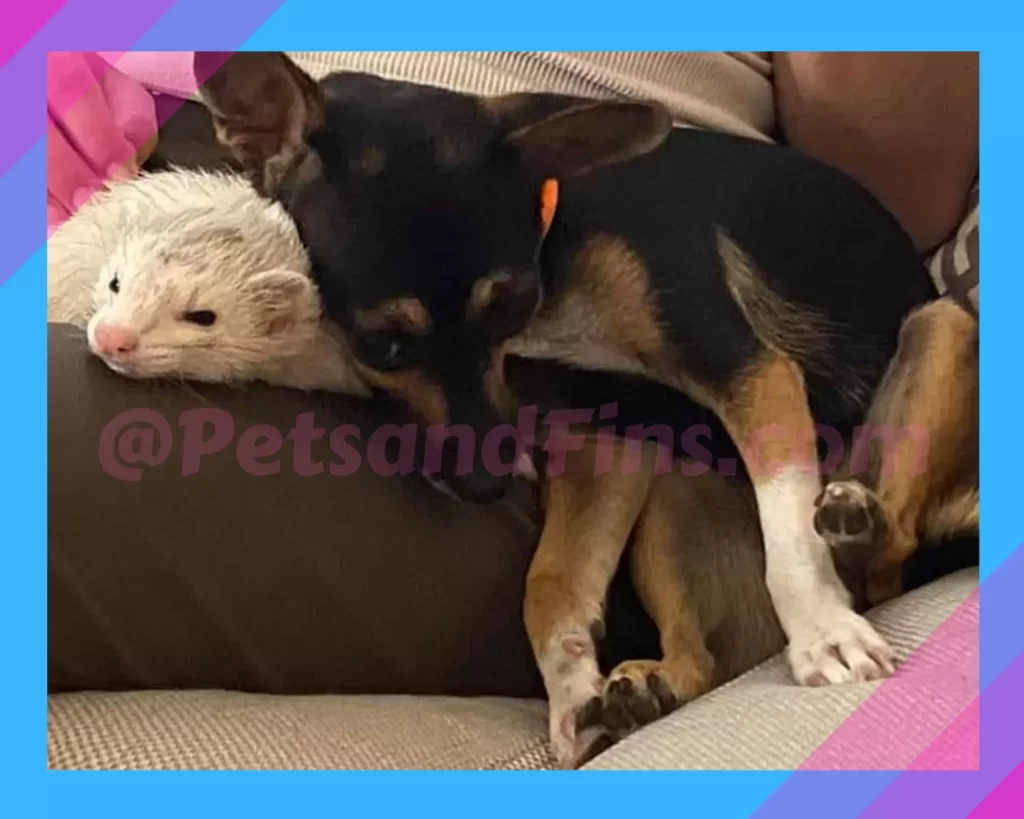
If you think you can’t handle another pet due to a lack of time or resources, it might be better to reconsider getting a dog at this point in your life.However, if you’re willing to put in the extra effort to make sure everyone in your household is happy and safe, then go ahead and add that furry friend to your family!

How To Introduce A Ferret For The First Time To Your Dog?
If you’re thinking of adding a ferret to your household that already includes dogs, it’s important to follow some specific steps for the introduction process.
The most important part is making sure both animals are comfortable and safe at all times, which means taking things slowly.
Here are a few tips on how to safely introduce a ferret to your dog:
- Introduce Them In A Neutral Territory:Start by having them meet in a neutral territory, like outside in the backyard. This will help reduce any chances of either pet feeling territorial about their home turf.
- Slowly Introduce The Dog To The Ferret In A Cage: To make it simpler for both animals to become acclimated to one another, try keeping the ferret in a separate cage when you initially introduce them.

To begin with, the dog should be permitted to approach and peek inside the cage and sniff, but not be close enough that it might contact or attack the ferret. This should continue for a few days until there is no longer any animosity from one animal towards the other.
During this time, do not leave them alone together!
- Keep Both Animals On A Leash And Allow Them To Interact: Now that the animals have become used to each other’s presence, it’s time to allow them to interact more. This may be accomplished by keeping them both on leashes and gradually allowing them to approach one another until they are comfortable with each other.
Again, do not leave them alone during this procedure!
- Don’t Force Interactions:Let them sniff and investigate each other under supervision; don’t force them to interact if they’re not ready yet. If either pet seems agitated or aggressive, separate them and try again later.
- Continuously Monitor Them: Once they have been introduced appropriately and are no longer fighting, you may begin observing them more attentively. Watch them while they play together to make sure there is still peace between them!

Even if everything seems to be going well so far, do not leave your ferret alone with your dog for an extended period of time — just in case anything goes wrong.
- Give Plenty Of Space:Make sure each animal has plenty of space to explore and doesn’t feel crowded or threatened.
- Be Patient:This process can take time, so be patient! It’s important to make sure both animals are comfortable with each other.It may take some time for them to develop friendships, but with patience and close monitoring, they will ultimately learn to coexist happily. And who knows, maybe they’ll wind up being excellent friends!
If you’re having any trouble introducing your ferret to the dog, don’t hesitate to ask for help from an experienced animal behaviorist. They’ll be able to guide you through the process and help ensure a safe and happy coexistence for all of your beloved pets!

Things To Keep In Mind When Having A Dog And A Ferret Together:
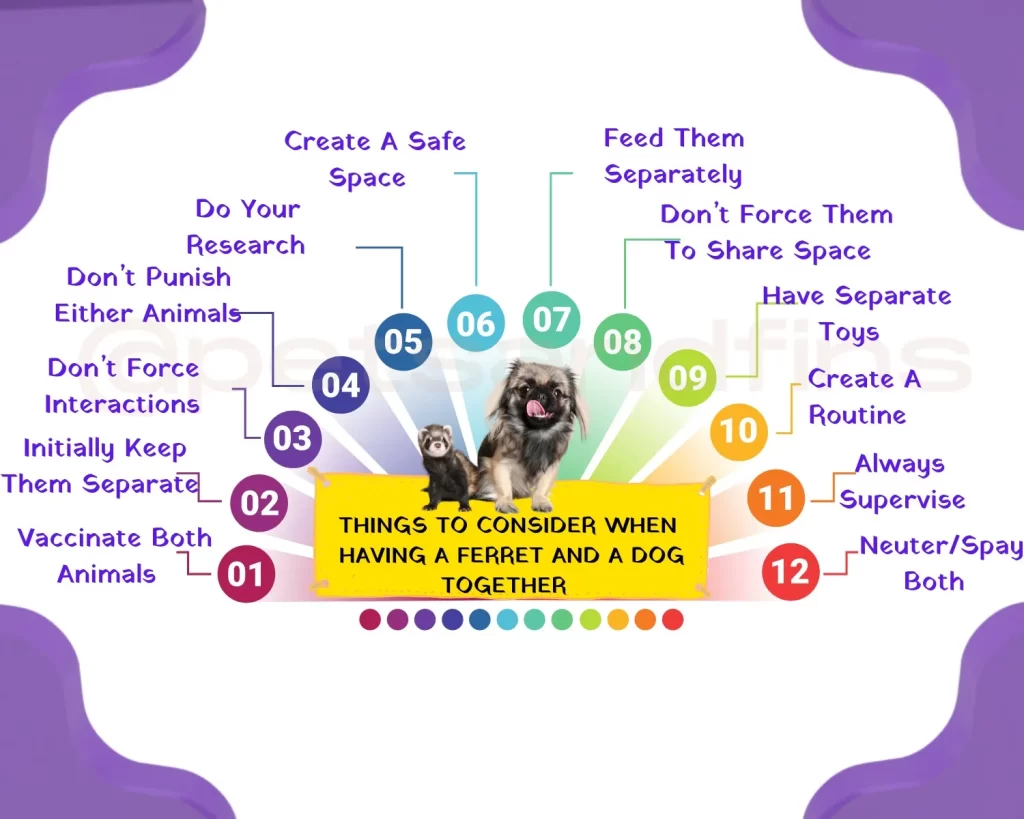
- Get Vaccinations Done:Make sure the dog and the ferret are in good health and have all of their vaccines up to date before you bring them home. This means that they’re less likely to have diseases that could hurt each other, which is good for them.
- Keep them apart at first: At first, try to keep them apart by either closing off a part of the house or setting up a big pet barrier between them (like one of those gates for dogs). Do this so that you can keep an eye on both animals and not have to worry about them getting out of hand.
- Do Not Force Interaction:Do not try to get animals to interact with each other. This will make both animals more stressed than normal, and it can make the whole experience bad for everyone.
- Do Not Punish Them: If something bad happens, don’t punish either animal. Instead, try to figure out how to make sure it doesn’t happen again in the future.
- Do Your Basic Research:Find out about dogs and ferrets as much as you can before you bring them into your home. Their likes and dislikes, etc., can help you figure out how best to take care of them.
- Provide Separate Things:It’s important to make a separate things for both animals. These separate things should include places to hide (for the ferret), separate litter boxes, separate water bowls, separate food dishes, separate toys for each animal that likes to play with, and anything else you think they might need.
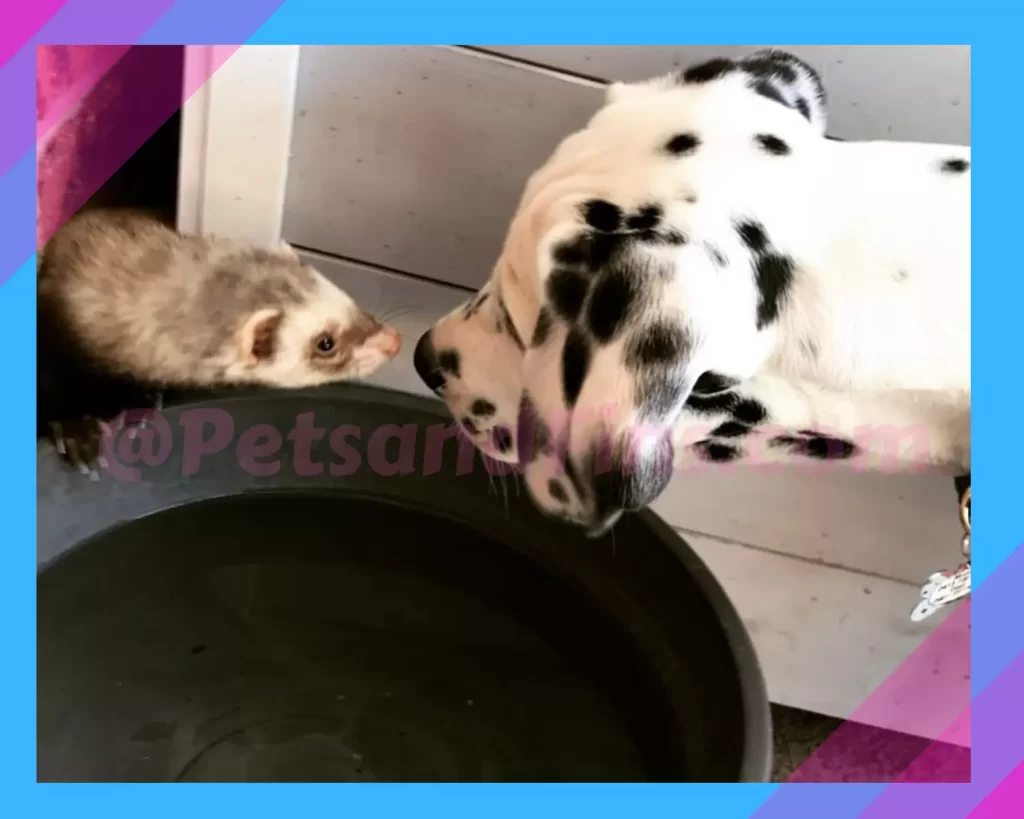
- Never Force Them To Share A Space: Never force an animal to share a space with another animal unless it is comfortable doing so.If you do this, it may result in serious problems for one or both animals, and attempting to fix it afterwards will only make matters worse!
- Feed Ferrets And Dogs Separately: Do not feed ferrets and dogs together.You do not want either animal to get hostile and compete for the same food.
- Maintain Separate Toys: Avoid leaving toys out where both animals can get them, since this may result in a conflict. Rather than that, maintain distinct toys in each animal’s secure place so they may play independently of one another.
- Create A Routine For Your Dog And Ferret: Creating a routine for your dog and ferret will help ensure that the animals understand what is expected of them.
- Keep an Eye on Their Interactions: Keep in mind that just because your dog dislikes ferrets (or vice versa), it does not imply that they can never learn to get along – but there may be some trial and error involved. It all relies on each animal’s willingness to communicate, comprehend what makes them happy/unhappy, and so on.)
- Both Animals Must Be Neutered/Spayed: This is a must if you want to keep your pets safe and healthy!This will help minimize the likelihood of any conflict or territorial issues.
Wrapping Up
Do ferrets get along with dogs? Yes. Introduce them slowly. Always supervise them. Ferrets are typically not aggressive animals, so if you introduce the two of them gradually and always keep an eye on both pets while they’re together, it should be fine to have a dog and a ferret living in the same household!
Be aware that some dog breeds may prey on small mammals like rodents or rabbits – even though your pet is domesticated, its genetic predisposition for hunting can still show up when it’s bored or wants attention .
If you have a ferret living in your home already, make sure that he or she has his or her own separate space where the dog cannot get into for safety reasons.
With a little patience, you can have the best of both worlds in your own home!
I hope this blog post has answered any related questions you had about ferrets and dogs living together! If there is anything else I didn’t cover in detail or if you still have more specific questions on this topic, feel free to reach out with your concerns by clicking the contact button below. Our team of experts will be happy to help answer any queries related to ferret behavior and care!
XoXo
Genie

